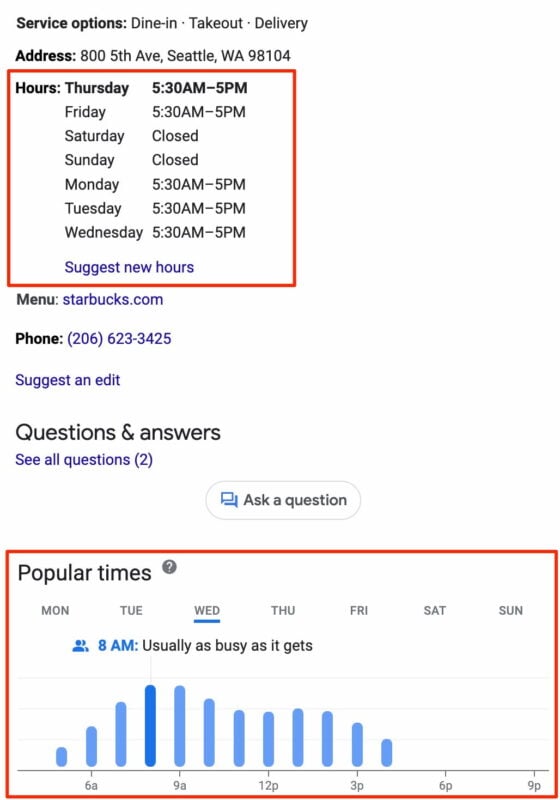In-store visits
It’s reasonable to expect Google to track our on-SERP and click behavior online. It has a near-complete picture of our offline behavior through its perpetual location-tracking of Android and iOS users with the Google Maps app installed. We see the outcome of this tracking in the Popular Times section of many businesses’ Knowledge Panels.

Google aggregates location data from any person it can — whether they’ve searched for a business or not — and puts that data front-and-center on that business’s Knowledge Panel. It even tracks how long people stay at a given company and whether the business is busier or less busy than usual.
This complete offline tracking helps Google offer its advertisers a “closed loop” of data on whether online ads lead to offline visits. To think that Google isn’t using this same closed loop of data for its local algorithm defies belief.
Regardless of whether knowing a business’s popularity before you visit is an acceptable tradeoff for your privacy, offline visits are the ranking signals that help Google identify local popularity and relevance most accurately — and they can’t be optimized.
Offline transactions
It took a while, but Google succeeded in the mobile payment space. Google Pay is now only second to Apple Pay and is closely followed by Samsung Pay. It’s hard to ignore data from tens of millions of consumers. Particularly in industries with frequent purchases like supermarkets, coffee shops, and gas stations, the volume of Google Pay transactions could be a reasonable indicator of the offline popularity of a business.
But Google is not only looking at mobile payments — it’s now looking at all costs. In 2017, Google partnered with credit card companies to track 70% of all consumer purchases. And in 2019, it was found that Google also keeps track of your other purchases by checking your receipts in Gmail. Google is increasingly looking to bridge the gap between the real world and the online world — especially in the commerce space –, so we can expect more on this front.
Social media is nice to have
Generally speaking, social media is not an essential part of local SEO. You should do the basics well. Primarily, “the basics” involve optimizing your social media profiles instead of your social media activity.
Social media basics for your local search strategy
At a minimum, every local business should claim a business profile on Facebook, Twitter, LinkedIn, Pinterest, and Instagram, even if you don’t plan to use some or all of those profiles.
Customers may look for you on those sites, and you don’t want them to come up empty, or worse: discover another business with a similar name and think it’s you. And you never know when you might decide to engage with customers on those social platforms – in which case, it’ll be nice to have an existing profile as a jumping-off point.
Social profiles offer some of the easiest inbound links and citations you can acquire, and it makes sense to utilize all relevant fields that major social media platforms offer you.
Setting up the social media profiles
At a minimum, use a high-quality logo or, if more appropriate, a personal photo. Pick a high-resolution photo or graphic representation of your business that you can use as a cover image. Hubspot produced this handy guide of the sizes you’ll need for each social platform.
Because each social profile can (and should) act as a citation, you’ll want to maintain a consistent business name across all platforms. This helps Google (and customers) associate these profiles with you.
Where possible, add your location information to your profile, even if it’s a city and state. This helps Google make that connection even more strongly.
If you don’t plan to use one or more of these profiles actively, pin a post to the top of that profile. That way, you can let customers know where they can find you. It doesn’t matter if that’s your website, email newsletter, or a different social channel you manage actively.
Comments
Post a Comment